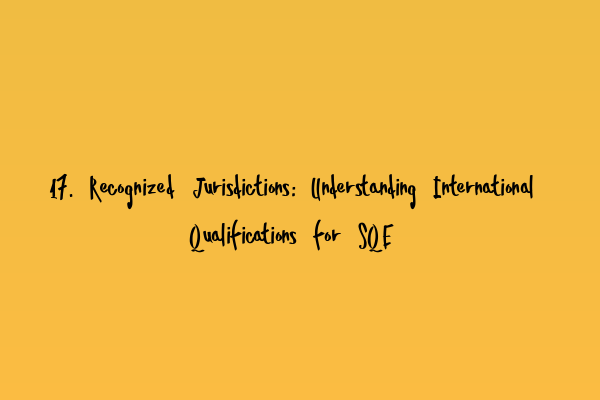17. Recognized Jurisdictions: Understanding International Qualifications for SQE
Aspiring solicitors around the world have their sights set on the Solicitors Qualifying Examination (SQE), the gateway to legal practice in the United Kingdom. For those who have gained their legal qualifications in recognized jurisdictions, understanding how their international qualifications are recognized for the SQE is crucial. In this article, we will delve into the intricacies of international qualification recognition and provide clarity on this important aspect of the SQE.
1. What are Recognized Jurisdictions?
Recognized jurisdictions refer to countries whose legal qualifications are recognized by the Solicitors Regulation Authority (SRA) in the United Kingdom. These jurisdictions have met the SRA’s stringent criteria for equivalence and are deemed comparable to UK legal qualifications.
If you have gained your legal qualifications in a recognized jurisdiction, you may be eligible for certain exemptions from the SQE. This means that you may not need to sit certain parts of the examination, saving you time and resources. However, it is important to note that exemptions are not automatically granted and are subject to individual assessment by the SRA.
Learn more about SQE exemptions in our article: SQE Strategies: Proven Tactics to Ace the Solicitors Qualifying Examination.
2. How are International Qualifications Assessed?
The SRA employs a comprehensive assessment process to determine the equivalence of international qualifications. This process involves evaluating the content, level, and quality of the qualifications in relation to UK legal qualifications.
When assessing international qualifications, the SRA considers factors such as:
- The length and depth of the curriculum
- The level of academic rigor
- The practical training requirements
- The assessments and examinations undertaken
- The ethical and professional conduct standards
It is worth noting that this assessment process may take time, so it is advisable to begin the evaluation process well in advance of your intended SQE examination date.
For a better understanding of applying legal knowledge in real-life scenarios, check out our article: SQE Case Studies: Applying Knowledge in Real-Life Scenarios.
3. Exemptions and the SQE
As mentioned earlier, if your international qualifications are deemed equivalent to UK legal qualifications, you may be eligible for exemptions from certain parts of the SQE. These exemptions are assessed on an individual basis, taking into account your specific qualifications and experience.
The exemptions granted will be specific to each individual and depend on factors such as:
- The jurisdiction where you obtained your qualifications
- The nature and level of your qualifications
- Your work experience and duration of legal practice
If you are granted exemptions, make sure to closely review the syllabus of the remaining parts of the SQE to ensure you are adequately prepared.
Discover more about the SQE and how it can benefit your legal career in our article: Solicitors Qualifying Examination (SQE): Your Gateway to Legal Practice.
4. Seeking Further Guidance
If you have obtained your legal qualifications in a recognized jurisdiction and are unsure about the exemption process or how your qualifications will be assessed, it is highly recommended to seek guidance from the SRA or an experienced SQE advisor.
These professionals can provide clarity on the specific requirements and assist you in navigating the complex process of international qualification recognition.
For time management strategies to help you efficiently complete the SQE, read our article: Mastering Time Management in SQE: Strategies for Efficient Exam Completion.
5. Conclusion
Understanding how international qualifications are recognized for the SQE is crucial for aspiring solicitors who have obtained their legal qualifications in recognized jurisdictions. By familiarizing yourself with the assessment process and potential exemptions, you can save valuable time and resources as you embark on your journey towards legal practice in the UK.
For a detailed analysis of your mock exam results and identification of areas for improvement, read our article: Analyzing Mock Results for SQE: Identifying Areas of Improvement.
Remember, the SQE is a challenging examination, but with proper preparation and understanding of international qualification recognition, you can increase your chances of success. Good luck!
